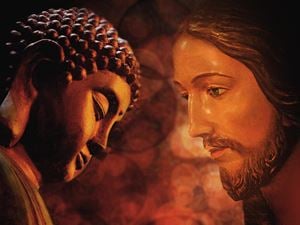
There are common threads which run through many of the world’s major religions. These threads are often extraordinarily fine, as hard to spot as a human hair fallen on carpet—but they exist, nonetheless.
One such may just connect two of the world’s most popular religions—Buddhism and Christianity. This thread lies in how the two belief systems define the cause of human suffering.
The Christian concept of sin and the Buddhist concept of dukkha—suffering caused by incorrect beliefs about the world— seem, on the surface, to be similar, perhaps even mirrors of one another.
Let’s take a closer look at these two concepts and see how deeply these similarities truly go.
Suffering in Christianity
In Christian theology, the root cause of suffering lies in alienation from God, caused by sin. The very essence of the Christian hell—the ultimate punishment—is, in fact, a permanent disconnection from the face of God.
Scripturally, from this disconnect arises entropy—the decline into disorder. In Genesis, Adam and Eve walk through the Garden of Eden alongside the very presence of God until their choice to sin caused them to be separated from Him. Since God’s nature is not only of love and mercy, but also of perfect justice, this separation was a necessity.
This, of course, brought about the Biblical fall, and the introduction of entropy to all creation—the end result of which is human suffering as imperfect man struggles to survive in an imperfect world.
Within Christianity, suffering is meaningful—God uses it to teach and guide. The Biblical book of Job deals with the problem of suffering, showing that it is directed by the wisdom of God, and although humankind may not be able to know the reasons behind their suffering, they must trust in that omnipotent wisdom. That trust is mankind’s answer to suffering.
Suffering is also impermanent for those who submit to the will of God, ending when they pass into the afterlife, into heaven, and are reunited with God. This is the ultimate end of suffering for the Christian.
Suffering in Buddhism
The first of the Buddhist Four Noble Truths is that “Life is dukkha”— the Buddhist concept of impermanence, dissatisfaction, and suffering. This is often translated as simply, “Life is suffering”. For Buddhists, suffering is without meaning, useless to the human condition, and so adherents see no value in it.
For the Buddhist, the cause of suffering can be explained by the Second Noble Truth, which teaches that the cause of suffering is craving. In this worldview, people constantly search outside the self for something to make them happy. But the problem with that is no matter how much we find—success, fame, money, or love—we never stay satisfied.
The Buddha wrote that this craving stems from an ignorance of the self, that we suffer because the world doesn’t work the in the ways we expect, and that our lives don’t conform to our expectations—our preconceived notions that don’t match reality are the true cause of suffering.
The Third Noble Truth teaches that we can put an end to suffering by addressing this craving, that we can escape from our state of constant dissatisfaction and enjoy the cessation of dukkha. This is achieved only through great difficulty—by letting go of the things that we think keep us happy, and learning to simply be happy with the way the world is.
The Fourth Noble Truth shows how to actually let those preconceived notions go. This is done by following the Buddhist Eightfold Path—eight areas of practice that affect all aspects of life. By following these eight ways to live correctly, an adherent can finally leave suffering behind.
A Dichotomy of Sorrow
It seems that, in both worldviews, suffering is caused by a yearning. In that light, are sin and dukkha the same?
The answer to this question lies in what that yearning is directed toward. The Christian concept of sin involves suffering, but suffering is not sin. Sin is alienation from God, and that alienation is the cause of suffering. In essence, suffering is the human yearning for God, and the inability to satisfy that yearning while on earth.
For Buddhists, the cause of suffering is wholly different—it is based in the human rather than the divine. For them, suffering—dukkha—flows from the difference between human desires and what reality offers. Here, suffering is yearning, itself, and the answer is simply to stop yearning.
The answer is no—sin and dukkha are quite different. One worldview aims to save mankind from suffering by reconnection with God. The other, by transcending human desire.
But an adherent of Christianity and a practitioner of Buddhism have much to learn from one another.
A Christian can certainly apply the Four Noble Truths to their life in their quest to lessen their suffering, while still holding fast to the idea that the desire for God is the only craving that must remain untouched. The Eightfold Path, too, holds great potential as a path to living out the will of God, as it directs us to treat others and ourselves in a way that does not cause pain.
A Buddhist, likewise, can learn from the Christian to see suffering as meaningful, rather than simply something to be escaped—when it is inescapable, realizing that it can have a purpose can do much for the ability to persevere.
The problem of pain is as old as humankind, itself—a problem that nearly every belief system attempts to address. Likewise, each of these belief systems contains wisdom, contains paths through which we might navigate the sorrows of life.
Remain open to receiving this wisdom from worldviews that may not be your own—the mind that can hold strong to its own worldview while still taking these nuggets of truth from other, possibly opposing, worldviews, is a strong one, and one that will take its owner through even the worst of trials.

